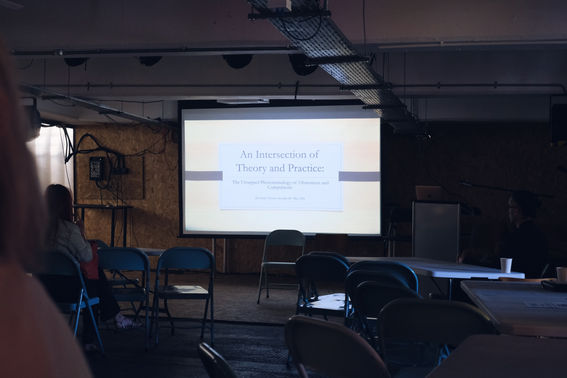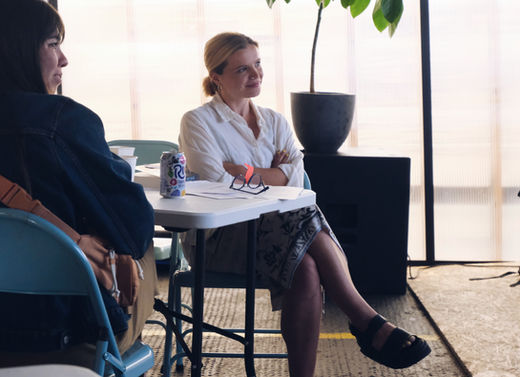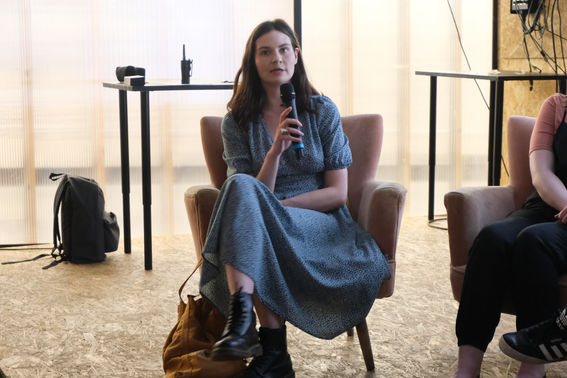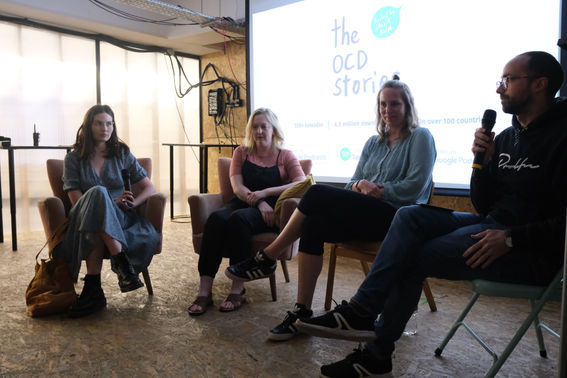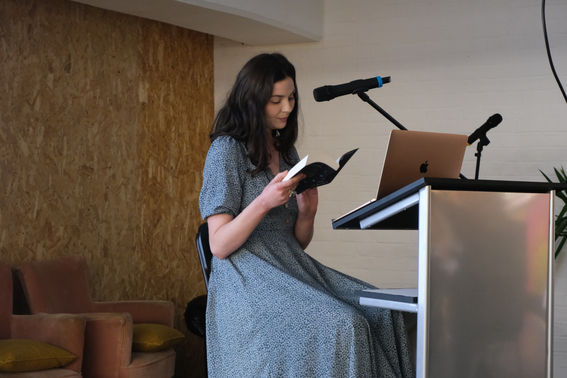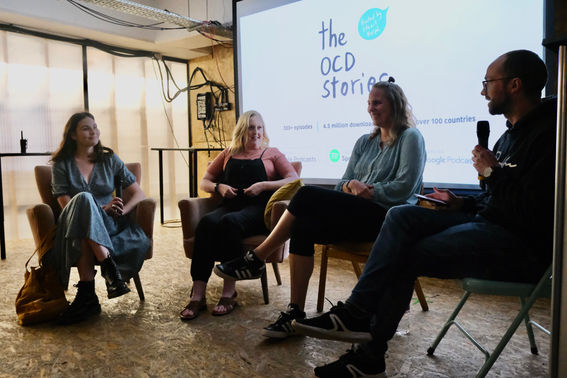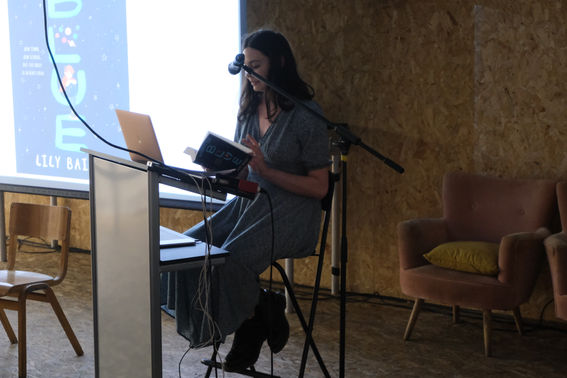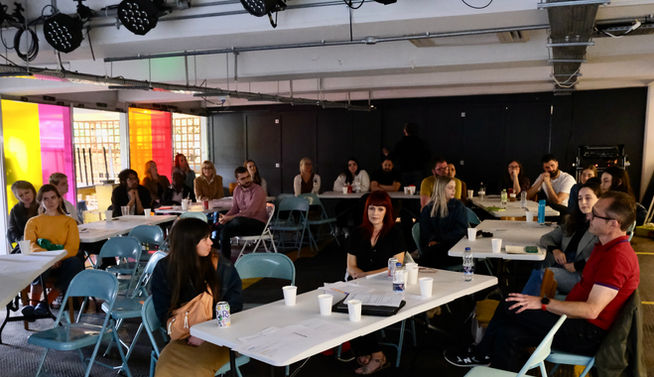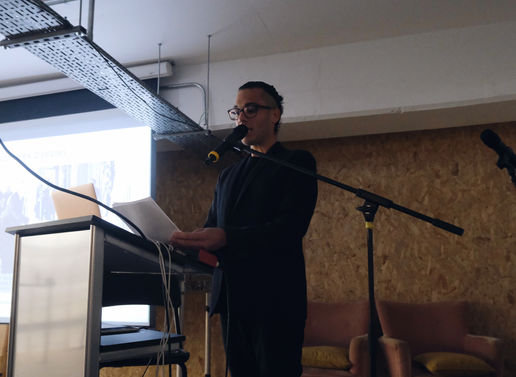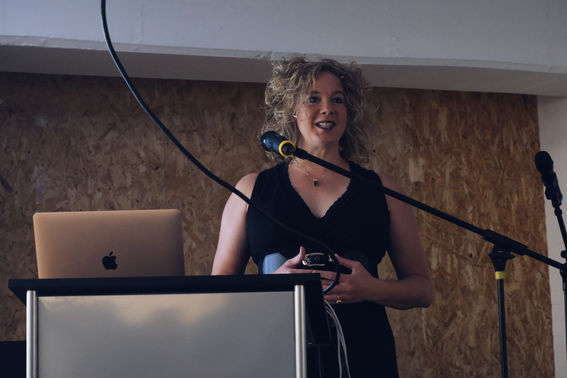
2022 - PECKHAM LEVELS, LONDON
Sponsored by the White Rose College of the Arts & Humanities, and the podcast The OCD Stories, the third edition of OCD in Society was hosted by Eva Surawy Stepney at Peckham Levels in South East London on 28 May 2022. Around 60 people attended the conference. The theme of the event was “Theory and Practice”. The main objective of the conference was to explore how the humanities, social sciences, activism, and the arts can offer ways to conceptualize, understand, and raise awareness about obsessive-compulsive symptoms. The conference brought together scholars, creatives, activists, clinicians, those with lived experience, and anyone else with an interest in OCD symptoms to reflect about how obsessions and/or compulsions are constituted by, embedded within, and regulated through forms of practice. “Practice” was interpreted to include practices of care for the body, regulatory practices, creative practices, and modes of performativity.
The event was divided into two parts, each providing a platform to explore different perspectives:
-
SOCIAL PERSPECTIVES: We had two roundtables discussing different issues: the first one in relation to the practice of healing through artistic expression, and the second on how to create "recovery cultures" through peer support specialists. We also had a handful of artists presenting their fantastic artwork.
-
ACADEMIC PERSPECTIVES: Social scientists and humanities scholars who are doing qualitative research on OCD presented their work. Dr Emily Chester gave a keynote lecture followed by six academics who use (among others) qualitative approaches to study OCD.
Presenters' biographies and abstracts, as well as pictures of the event, can be found below.



ACADEMIC SPEAKERS

Dr Emily Chester completed her PhD in 2019 at the University of Bristol, UK. Her doctoral thesis was on the topic of the phenomenology of obsessions and compulsions in Samuel Beckett's writing, and, as well as Beckett's work, her research interests include modernism and illness, the psychological and psychiatric representation of literature, writing and therapy, and refugee narratives. In 2017 she published an article for the journal, Samuel Beckett Today/Aujourd'hui entitled "Obsessive Compulsive Ir/rationality in Watt" and in 2021 she published an essay on Samuel Beckett and the Anthropocene in the collection, Modernism and the Anthropocene. As well as embarking on an MA in history at the University of Birmingham, Dr Chester continues to research, write and present work in the field of the medical humanities.
An Intersection of Theory and Practice: The Untapped Phenomenology of OCD
The “disease entity” of OCD is omnipresent in contemporary culture, and yet, our understanding of the experience of OCD is still radically misunderstood and/or unexplored. Engaging with the phenomenology, or the lived experience, of OCD has radical and untapped potential to increase both public understanding of what OCD entails, as well as helping those who have OCD to better recognise and manage their symptoms. In this talk I will argue that the intersection of theory and practice has many untapped benefits in academic, clinical and experiential fields. My talk will first outline how the intersection of theory and practice might manifest; following this I will consider how the application of the phenomenological approach might operate on a practical level; this will then be exemplified by two of my own examples of the fruitful coincidence of theory and practice: 1) OCD and its relationship to philosophical concepts of rationality and irrationality, 2) the performance of obsessive-compulsive symptoms on stage in Jess Thom’s production of Samuel Beckett’s Not I. After exploring these case studies, I will consider how phenomenological awareness of OCD might be utilised by those with OCD to help them to live more fulfilling and less painful lives.
Emily Chester
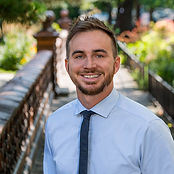
Matt Hiller is a candidate in the joint social work and anthropology doctoral program at the University of Michigan and a practicing psychotherapist. His doctoral research looks at the ways that Ketamine and other psychedelic therapies are shaping understandings of selfhood and intervention in mental health care. As a person with lived experience of OCD, Matt maintains on ongoing interest in exploring how the condition can be both and object and basis for critical inquiry and how perspectives from social sciences and philosophy might guide advocacy or new approaches to care. Prior to starting his doctoral program, Matt received his masters degree in social work from the University of Chicago and received training the Mood and Anxiety Disorders Program at the University of Illinois at Chicago Department of Psychiatry and the Chicago Center for Psychoanalysis.
The Paradox of Purity: OCD and the limits of certainty
This talk draws on Mary Douglas’s classic anthropological text Purity and Danger to explore how experiences of OCD illustrates the co-constituting relationship between order and disorder. OCD, we argue, shows how attempts to assert certainty and order produce the new forms of disorder. We imagine OCD not as an obsessive need for certainty, but as a mode of life where certainty fails. To this end, we also engage with writings by Maggie Nelson to envision the affective and relational possibilities that exist within modes of ambiguity and indeterminacy and to consider how experiences might offer insight on living at the limits of certainty.
Matt Hiller

Brooke Bastie is a poet and a Ph.D. candidate in English at the University at Buffalo. Her academic work investigates how contemporary American poetry explores space as coterminous and palimpsest. Her poetic work, some of which is published in p-queue, has recently explored her OCD.
Household Objects
In my experience, individuals, like myself, with obsessive-compulsive disorder (OCD) maintain a well-tended distinction between private and public. In this way, when someone with OCD engages in society, their constructed and acceptable façade deploys cloaking any abnormal tendencies present in their private life, which is a haven for complete control where their phenomenological experience of space develops its own matrix of rules and regulations to keep the system afloat. I found that in engaging with my own OCD and the spatial forms in which it manifests, it becomes most evident through my interactions with material objects. For example, I might click the oven off an even number of times before bed. But, when the system I generated breaks down, bouts of intense obsessive-compulsive symptoms such as checking, rituals, and intrusive thoughts emerge, causing unbearable mental and physical anguish. When dealing with OCD, one of the most important steps in formulating a healthy lifestyle, other than seeking both psychiatric and therapeutic help, is to discuss OCD with those present in your life. However, when explaining these symptoms to individuals without this neurological configuration – the circuits through which my thoughts pass – my reactions often do not make sense leading to frustration, confusion, and lack of empathy from my closest friends and immediate family. For this reason, the spatialization of my OCD through both the objects I encounter as well as the poetry I write helps others in my life understand and empathize with my symptoms. Therefore, at the 2022 OCD in Society conference, I would be honored to share some of my poetry with others. One of my poems has been published in p-queue, which you can view it here. I am currently working on a book-length project, from which I would appreciate the opportunity to share selections.
Brooke Bastie

Abigail Savitch-Lew is an MFA in Creative Writing student at Rutgers University-Newark. Originally from Brooklyn, New York, she is a former staff reporter for City Limits and her journalistic work has additionally appeared in The Appeal, YES! Magazine, Colorlines, The Nation, Dissent Magazine, Jacobin, Open City, and Urban Omnibus. She is currently working on her first novel as well as a memoir based on her experiences growing up with Obsessive Compulsive Disorder.
The Motif – a lyric memoir
The Motif is a lyric memoir (a memoir in fragments and employing poetic devices) that uses my personal experiences from ages four through 30 to educate audiences about Obsessive Compulsive Disorder. The memoir's mission is to provide subjective insight into the disorder that includes, but also pushes beyond, what can be found on contemporary medical websites about symptoms, treatment and recovery. I am interested in exploring the relationships between sexuality, creativity, sociopolitical conditions and OCD. Using Eva Suraway's Guilty Obsessions as one theoretical basis, I seek to unravel how the OCD sufferer is attuned to, and suffers additionally from, the contradictions of a racist, capitalist system. These systems exacerbate the conflict of the Ego by pitting individual interests against collective interests. One solution, in my experience, is building communities of OCD sufferers that are spiritually devoted to the acceptance of uncertainty, which helps to reduce the shame and isolation of the OCD experience. Building off my earlier journalistic publication in City Limits, "NYC Youth Struggling with OCD Face Compounded Challenges in Pandemic," I also hope to expose race and class-based inequalities to treatment for OCD. Finally, the memoir is simply my own story: a bildungsroman, a love story, and a portrait of my coming-to-be as an artist. Both my art and my OCD spring from an active imagination, and my goal now is to channel my imaginative power into art and creation, instead of into my OCD. It has been a deeply cathartic experience to frame my history with OCD on my own terms.

Poppy Plumb
Poppy Plumb is a linguistics PhD student at Lancaster University who has been living with OCD since 2010. She is interested in how OCD is linguistically constructed by individuals with the disorder and popular media representations. Her research also explores how people with lived experience can participate in applied linguistics research. The paper presented at this year's OCD in Society conference comprises of research completed for her Master's dissertation. You can find Poppy here.
A corpus-assisted critical discourse analysis of OCD in the UK press
Continued misunderstanding about the realities of OCD continue to permeate popular media representations of the disorder. It is often depicted with ‘levity and humour’, as complex compulsions are reduced to quirks and distressing intrusive thoughts rarely present (Cefalu, 2009). Spencer and Carel (2021) argue that OCD is simultaneously subject to processes of stigmatisation and trivialisation, conceptualised as ‘wrongful depathologisation’, as individuals with the disorder are judged ‘too ill to be free of stigma but not ill enough to be taken seriously’. Building on this concept, this paper examines representations of OCD in the UK Press between 2017-2020 to discern what linguistic resources are used to talk about OCD, and in particular, how a discourse of wrongful pathologisation is systematically constructed through language. Methods from corpus linguistics are used to facilitate the large-scale study of a sample of news reports, totalling over 1 million words, that mention OCD. Combined quantitative and qualitative methods reveal that a discourse of wrongful depathologization is constructed in the pre-modification of OCD, including the adjectives ‘bit’ and ‘so’, and semantic differences between describing repetitive OCD behaviours as ‘rituals’ or ‘compulsions’. These findings substantiate the concept of wrongful depathologisation in the context of UK news reports and suggestions for linguistic choices in news reports about OCD are proposed.

Jordan Williams
Jordan Williams is working on his P.h.D. in biblical counseling at The Southern Baptist Theological Seminary in Louisville, Kentucky. He is a certified counselor with the Association of Certified Biblical Counselors (ACBC). He pastors and counsels at Shadowbrook Church in Atlanta.
Who’s to Blame? Rethinking OCD’s Guilt and Atonement Practices Within a Normative Moral Framework
This paper will explore the phenomena of guilt and atonement practices in the obsessive-compulsive experience from within a Christian social imaginary. Compulsive, atoning practices driven by religious guilt obsessions cannot be understood within theoretical and personal frameworks of meaning isolated from the normative beliefs and subjective imagery instilled by one’s social imaginary. The obsessive-compulsive’s misplaced guilt experiences and misguided atonement practices, when placed under subservience to the convictions of one’s foundational moral matrix, necessarily open themselves to a benevolent reinterpretation of these guilt feelings and a productive redirection from these behavior patterns. While the moral fabric of the historic Christian faith is not inherently to blame for one’s experience of obsessive-compulsive phenomena, inconclusive hermeneutical practices of the Christian faith may drive an individual adherent into destructive cognitive, affective, and behavioral patterns. Wholistic care for such an individual, whose subjective guilt manifests relative to a shared and normative religious faith, ought to include assistance arising from within their moral community, the Christian counselor, for instance. Such kinds of moral agents are primed for meaningful and winsome guidance to an obsessive-compulsive counselee burdened with guilt feelings and their resulting compulsions, such as self-regulated atonement. As one providing a contextualized, accurate, and compelling construal of their shared social imaginary, the Christian counselor offers a patently trustworthy voice to the obsessive-compulsive counselee in the task of cultivating healthier cognitive, affective, and behavioral habits—through such means as Scripture-guided meditation—that enable a recalibration of the counselee’s moral imagination and sense of spiritual hope from within a mutual moral framework.

Matheus Sanita Lima
Matheus Sanita Lima is a PhD student in Biology at the University of Western Ontario, London,Canada. His primary research focuses on the molecular evolution of organelle genomes. After having struggled with OCD for many years, he decided to apply his expertise in genetics and evolution to study OCD under an evolutionary perspective. Matheus now seeks to shed light on molecular mechanisms that might explain the nature and prevalence of OCD. Aware of the disconnect among different players of the OCD community, Matheus hopes to produce sciencethat is translational and connective. His aim is to build bridges between “OCD experts” and patients, ultimately contributing to the discussion of OCD in society at large.
OCD: a multifaceted condition demands a multidisciplinary approach
The pervasiveness and impact of obsessive-compulsive symptoms cannot be overstated. Accounts of OCD-like manifestations date back to as far as the Middle Ages; however, OCD symptoms must have accompanied humanity since its inception. From Jean-Pierre Falret and Freud to today, long strides have been taken in the investigation of this intricate condition. Currently, OCD is understood as being part of a spectrum of symptoms that covers a wide range of related disorders. The biological causes seem to be just as varied, and treatment options have become somewhat abundant. Exposure and Response Prevention (ERP) combined with selective serotonin reuptake inhibitors (SSRIs) form the gold standard treatment and their efficacy is beyond doubt. However, the general population still suffers from the lack of qualified information and poor access to appropriate treatment. Not enough mental health professionals, along with the sluggish development of new pharmaceuticals are just two of the many obstacles that OCD sufferers face today. I argue that the OCD community should foster more collaborations among its diverse niches. Different therapy styles, such as ACT, DBT, and MCT, all contribute to the treatment of OCD, but are mostly not being informed by (or informing) the research done at the neurological and molecular level. This disconnect creates diverging views of what OCD is, and different members of the community are often left astray amidst the deluge of seemingly disparate models. I propose that the OCD community can only progress if spurring a cross-talk among its sub-disciplines. Genetics, neurophysiology, and psychology need to be intertwined, if we want to keep on improving the current state of things. Here I present how OCD is viewed in biological studies, and how these views can inform, be informed and merge with the ways other subdisciplines (and patients) understand this condition.
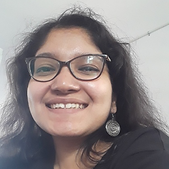
Dr. Nilanjana Ray
Miss Nilanjana Ray is an Assistant Professor in the Department of English, Hans Raj College, University of Delhi. She is also pursuing her M.Phil from the Department of English in University of Delhi. Her research interests include illness in literature, gothic studies, Indian literature and gender studies.
One plastic bag at a time: embodying the disease(s) - OCD and untouchability
In this presentation, I have tried to depict how “plastic pollution” along with its associated ills affect people in highly stratified societies and how mental health disorders like OCD become an excuse for further “othering” of those suffering from it and investing marginalised groups with the tag of a “contaminant”, thereby rendering them as untouchables. The short story “Untouchability” by Sumana Roy has been used to depict how literary responses and representation of OCD accommodate the changing nature of the contaminant, especially in cultures where some form of untouchability is practised.
OCD ADVOCATES & ARTISTS

Chrissie Hodges
Chrissie Hodges is a Certified Peer & Family Support Specialist. She is the founder of Treatment for OCD Consulting providing peer support and referral consultations. She is the Chief Operating Officer and co-founder of Peer Recovery Services (PRS). PRS was awarded the Government contract to place peer support specialists in the Colorado state civilian and forensic mental health institutions. Chrissie is the author of ‘Pure OCD: The Invisible Side of Obsessive-Compulsive Disorder” and is an international advocate for mental health, specifically for OCD. She is the founder and executive director of the non-profit ‘OCD Gamechangers’.

Chance McNeely
Chance McNeely, is the co-founder of The Delta Resource Group, a US based government and public affairs consulting firm. Raised in the State of Louisiana, he began his career working on Capitol Hill in Washington, DC. He went on to move back to his home-state where he worked for two Louisiana Governors. . He also led the statewide trade association for the trucking industry. McNeely holds an undergraduate degree in agribusiness and a Master’s in Public Administration from Louisiana State University. In 2018, McNeely was diagnosed with OCD and, after receiving proper care, became a certified peer support specialist.
Utilizing Certified Peer Support Specialists in Creating Recovery Cultures
Peer support is a relatively new professional concept and supplemental support for individuals working toward recovery for mental health/substance use. Peer support is rooted in the transformation of mental health treatment from the medical model toward the recovery model. Peers use their lived experience of mental health and substance use to walk alongside others working toward recovery. Their role is of mutuality, intentional support, and empowering individuals to find their voice in playing an active role in treatment protocols and shared decision-making. Peer support is not a replacement for therapy, but acts as a supplemental support for individuals in any phase of the recovery process. The core competencies of peer support as a profession are rooted in trauma informed care, person centered, and strength based support. Chrissie Hodges and Chance McNeely are state certified Peer Support Specialists providing intentional peer support for individuals worldwide living with Obsessive-Compulsive Disorder. We provide a safe, confidential and supportive space by using our lived experience with OCD symptoms, treatment, and recovery to walk alongside clients in supporting and empowering them in orchestrating their unique recovery experience. We have found that peer support specific to OCD can drastically reduce the shame and guilt around intrusive thoughts and can help motivate people to seek professional help by knowing they are not alone. We have also found peer support to help drastically reduce shame and stigma post-treatment as individuals reflect and cope with their experience of developing and learning to manage mental illness. Our goal in this presentation is to share our experiences as peer support specialists, how it impacts our clients, how peer support impacted our own recovery journey, and to answer any questions on how peer support can be implemented or contracted out to organizations and therapeutic practices to help support and emphasize recovery cultures.

Lily Bailey
Lily Bailey is a writer and journalist. As a child and teenager, Lily suffered from severe Obsessive-compulsive disorder (OCD). She kept her illness private, until the widespread misunderstanding of the disorder spurred her into action. In 2014 she began campaigning for better awareness and understanding of OCD. Her critically acclaimed first book for adults, Because We Are Bad (May 2016), recounts her experience of OCD, and was published in the UK, US, Australia and Germany. In 2019, she was awarded the Illumination Award, which is presented by the IOCDF to media personalities and influencers who have accurately and
respectfully represented OCD and related disorders. She continues to write and
speak publicly about OCD and mental illness, and blogs for Psychology Today.

Jonathan Tilley
Jonathan Tilley is a wood carver, poet and gardener and a lifelong sufferer of OCD. He finds that being creative helps him to cope with the struggles that the condition brings. Jonathan uses art and poetry to express his relationship with OCD and shares his work on social media (Chipping away at OCD) to raise awareness of the illness. You can find Jonathan on Instagram and Facebook.



Art as healing (A live podcast)
The host of The OCD Stories Stuart Ralph will interview two prominent British advocates in a live podcast panel. Catherine Benfield of Taming Olivia, and Laura Johnson of OCD Doodles. They will discuss how they use art as healing, whether art offers any new insights on OCD, and how art can help spread awareness amongst people affected by OCD. There will be opportunity for audience questions.
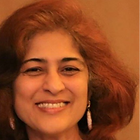
Usha Amin
Usha Amin is an artist, designer of programs on creative learning for conscious leadership by knowing your true self. She is an awareness coach, mentor, trainer in the field of emergence - “the power of unfolding your purpose through the power of patterns.” She is a curious learner and researcher on mind science and has been studying the science of neuroplasticity, thoughts, behavior and action. Using the science of Yoga, meditation, breath work, art and through simple and subtle techniques she enables the mind to come to a state of calmness and attentiveness to create a field of purpose. Understanding the uniqueness of individuals, she designs and customizes the programs.
Healing through Art
A program called “The Lighthouse” was designed for students of an Ashrama in the age group of 13-18 years, using various art forms like Mandala art, free hand, dot mandala, zig zags patterns , painting, charcoal, clay modelling, yoga, dance, gardening and heart activation meditation. The students are from stressed background and mentally disturbed. The school observed significant changes in the students brain and physical activities. By the end of a three-months weekend class, it was noticed that the students who were dull and non-participating became more active and engaging. In the other students, also a remarkable improvement in their academics was reported by their teachers. We have been requested to continue the program for the next batch of students. These students have practically not been schooling due to the frequent lock downs and hence been struggling to cope with even simple stuff. Within two weeks of starting the program, it is reported that there is significant improvement in the concentration and response of the students. I would like to take the heart activation meditation for the OCD group and with the feedback would like to take on further as a practice to be included in the CMT and CBT therapies.
